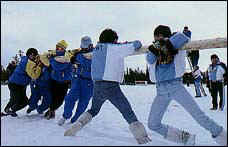Benefits of the Arctic Winter Games
- The Arctic Winter Games provide lasting legacies to everyone involved.
- For the participant, the Games provide an opportunity for the developing athlete to compete in friendly competition while sharing cultural values from northern regions around the world.
- For sport, the Games provide a vehicle for sport development throughout the north.
- For host communities, the Games provide an opportunity for community development, confidence building and pride.
- For governments, the Games enhance the establishment of effective partnerships in order to improve the lives of northerners while promoting northern unity and cultural understanding.
- In this regard the International Committee will help to promote the benefits of the Games and work effectively with all key partners, including major television and media outlets, in order to ensure that the benefits are broadcast to the widest possible audience.
Providing Leadership to Safeguard the Future of the Games
As stewards of the Games, the International Committee provides leadership to safeguard the future of the Games.
The International Committee is entrusted to:
- Integrate a strategic planning process that includes input and participation from all key partners.
- Develop and update policies that reflect the impacts of the changing environment as well as the needs of key partners.
- Ensure that the structure and decision making processes reflect the stewardship role entrusted to the International Committee by its partners.
- Ensure that the Committee is and is perceived by others to be a responsive, professional, accountable and well managed organization that works to meet the goals and objectives of the organization and the needs of its partners.
- Ensure that the Committees' financial resources are well managed and are sufficient to successfully carry out the Committee's mission over the short and long term.
The Future

The benefits from the Arctic Winter Games are acknowledged and shared by all participating units and key partners. Pole_Push.jpg (10626 bytes)
However, the environment is changing and increased pressures are being exerted on the International Committee. Governments are experiencing reductions in budgets and the roles of governments are changing rapidly. Every year new units approach the International Committee to become participants. Recent examples include Northern Saskatchewan, Northern Quebec, Iceland and Northern Scandinavia.
The two Russian provinces of Tyumen and Magadan's involvement has had an extremely positive impact, especially from a media and marketing perspective. In 1999 the NWT officially split into two new territories - Nunavut and the Northwest Territories.
The new millennium started with the XVIth Arctic Winter Games in Whitehorse, Yukon in 2000 with the addition of Nunavut and the Russian province of Chukotka replacing Tyumen. In 2002 the Games were co-hosted in Nuuk, Greenland and Iqaluit, Nunavut. This was the first Games to be hosted off the North American continent.
The 2010 Games were hosted in Grande Prairie Alberta and the 22nd Arctic Winter Games were hosted in Whitehorse, Yukon in March 2012.
Fairbanks, Alaska hosted the Arctic Winter Games in 2014. The 2016 Games were hosted in Nuuk, Greenland.
Future Games and Hosting Jurisdiction
2018 South Slave, NWT